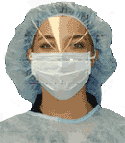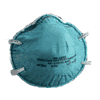A
good mask is one that does not allow any air to get thru from the sides.
|
|
|
|
Cypris
ISOSAFE O.R. face masks
Case of 300 (6 boxes of 50)
Rely on ISOSAFE's high
filtration micro-fiber filter media with a BFE rating exceeding AORN standards.
Each ISOSAFE mask features threelayers, with the innermost layer soft and
smooth for maximum comfort. An adjustable nosepiece ensures a custom fit.
Earloop style. 6 boxes of 50 per case. |
Cypris
ISOSAFE earloop Face Mask with Wrap-
around eye shield - case of 300
The face mask
with shield is designed to reduce the exposure of the wearer to potentially
contaminating fluids.
The two components are the comfortable and efficient earloop face mask and
the clear plastic wrap-around shield.
Mask and shield exceed AORN standards, ensuring staff protection against
air borne particulates.
The two outer layers of the earloop face mask help prevent leakage, assuring
staff safety, while the innermost layer is soft and smooth for a more comfortable
fit.
The shield can be worn with eye glasses underneathe and even helps eliminate
eye glass fogging, ensuring better staff efficiency.
It's secure to the face mask, eliminating "blow-by" and providing
one-piece full facial protection. |
Surgical
Masks and Particulate Respirator -
Health Care / Personal Protection
Box of 20
A particulate respirator
and surgical mask that is NIOSH approved as a Type 95 respirator and meets
CDC guidelines for TB exposure control. It is designed specifically for
use in health care settings, but can also be used for home health care
and personal protection. This protective mask includes a soft inner shell
for greater comfort against the face, and since it is fluid resistant,
it helps reduce potential exposure of the wearer to the spray, spatter,
and aerosol of blood and body fluids.
Other Benefits:
Can
be used during laser surgery, electrocautery, and other procedures using
powered medical instruments to help reduce wearer exposure to airborne
particles generated during these procedures.
99% Bacterial Filtration Efficiency ( BFE ) to help reduce patient contamination
caused by exhaled microorganisms.
Does not contain either natural or rubber latex or dry natural rubber
as components in the product or its packaging.
Hypoallergenic to reduce chance of allergic reaction.
Sorry, these
3M products are not available to purchasers outside of the U.S.A.
Due to high
demand, these masks will ship June 10, 2003
|
Click
for more detail and
order information |
Click
for more detail and
order information |
Click
for more detail and
order information |
The efficacy of surgical masks in avoiding SARS PRINT FRIENDLY EMAIL STORY
PM - Thursday, 24 April , 2003 18:24:00
Reporter: Rafael Epstein
MARK COLVIN: In TV images from Singapore to Toronto, the surgical mask has become
the symbol of the panic over SARS. But is its protection any more than psychological?
Not much, say the experts. And experts still don't know either the scale of
the threat SARS poses.
The World Health organisation expects to establish a vital fact very soon
to gauge the extent of the threat. By this weekend they expect to know whether
only sick people are contagious, or whether there are many people around the world
who are unaware that they're carrying the virus.
Rafael Epstein reports.
RAFAEL
EPSTEIN: If you're unlucky enough to come across someone who has SARS, how would
you catch the virus? Saliva is thought to be an unlikely carrier of the virus,
but the tiny droplets of moisture a victim exhales, are highly likely to be infectious.
Which is why people are wearing masks.
But Professor Yvonne Cossart
from the Department of Infectious Diseases at the University of Sydney, says a
mask is only effective for about fifteen minutes, before it needs to be replaced.
YVONNE
COSSART: A surgical mask traps the droplets that are in the air you breathe out
and that's very useful in trapping viruses because that's where they concentrate.
So it's not that the filter has got to be small enough to hold back the virus
particles, which need very expensive and very cumbersome filters, but the ordinary
surgical masks hold back those droplets in the air.
Now, the snag is those
masks are only effective so long as they are dry. As soon as they become saturated
with the moisture in your breath, they stop doing their job and pass on the droplets.
RAFAEL
EPSTEIN: So they're not really effective for very long?
YVONNE COSSART:
That's right. You need to change them. It's usually about every fifteen or twenty
minutes. If you change your mask of course, you're going to get any germs on your
hands that are on the surface of the mask.
RAFAEL EPSTEIN: Even if you've
got a mask, every time you might change it, each fifteen minutes, whatever could
have infected your mouth could be on your hands.
YVONNE COSSART: Yes, that's
right.
RAFAEL EPSTEIN: So is it worthwhile wearing a mask at all?
YVONNE
COSSART: It's not got a good track record of stopping epidemics of respiratory
disease.
RAFAEL EPSTEIN: If you were in Beijing or Toronto, would you wear
a mask?
YVONNE COSSART: I wouldn't, unless I was going into a room with
sick patients.
RAFAEL EPSTEIN: And in that case, you'd wear one with a filter?
YVONNE
COSSART: Yes, or even a surgical one if I was only going in briefly.
RAFAEL
EPSTEIN: But there is one method that works with all other more common viruses;
a simple method to prevent infection – simply wash your hands before you
eat or touch your face. So what of the warnings to stay away from cities like
Toronto.
Are they warranted?
YVONNE COSSART: I think a lot depends
on your perceptions of risk and what you're willing to think is a reasonable risk.
The problem for anyone offering advice is that they're guessing on the basis of
rather inadequate numbers.
What we don't know, but should know fairly soon
now these tests are available, is whether all the people that are sick are all
the people that are infected. Or whether in these areas, where there are a lot
of cases, there are many people who are infected, but not sick.
Because
if there's a big reservoir of fairly well people with the virus, of course, the
chances of you being exposed are much higher. So until that's settled, it really
is difficult to give really good scientific advice, and the advice really relies
upon how much you want to go.
RAFAEL EPSTEIN: How much of a danger is it
compared to all the other things that you might catch when you go either to a
country like Canada or China? Presumably there are other diseases in the air and
on the surfaces in those countries that are also lethal sometimes?
YVONNE
COSSART: In all countries. I mean, the world is full of microbes and your susceptibility
to them is more important probably than whether they're there or not.
MARK
COLVIN: Professor Yvonne Cossart from the Department of Infectious Diseases at
the University of Sydney, with Rafael Epstein.
And tonight, China has reported
another 125 cases of cases, 4 more deaths.


